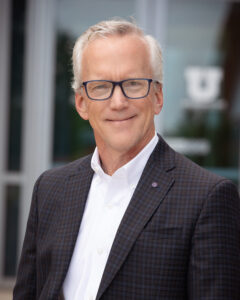 The Department of Mechanical Engineering is excited to welcome Dr. Mark Maier as a professor (lecturer) this fall. Dr. Maier has decades of experience spanning both academia and industry with expertise in systems architecting and aerospace engineering. He will be teaching model-based systems engineering and system architecture as part of the Systems, Industrial, and Management Engineering program.
The Department of Mechanical Engineering is excited to welcome Dr. Mark Maier as a professor (lecturer) this fall. Dr. Maier has decades of experience spanning both academia and industry with expertise in systems architecting and aerospace engineering. He will be teaching model-based systems engineering and system architecture as part of the Systems, Industrial, and Management Engineering program.
Dr. Maier comes from a very aerospace and engineering oriented family. His father and uncle were both aerospace engineers, his grandmother built aircraft during World War II, and his mother was a secretary to Simon Ramo, one of the fathers of systems engineering. Maier’s undergraduate degree from Caltech was in Engineering and Applied Science, followed by an MS at Caltech and a Ph.D. in Electrical Engineering at USC.
“My first academic job was at the University of Alabama in Huntsville. One of the highlights was being faculty advisor to an early student-built satellite project. SEDSAT-1 was launched as a ride-along on a NASA Delta II mission in late 1998,” said Maier.
After his time at the University of Alabama, Maier began working for The Aerospace Corporation, a non-profit federally funded research and development corporation chartered with oversight of the national security space program. Maier spent 26 years working across a wide variety of space and intelligence programs and developing professional development programs inside Aerospace and for its customers. Most recently, he has been at Hill Air Force Base on the Sentinel program, acting as the Chief Architect on the government side of the program.
“I’ve always enjoyed the classroom,” said Maier, “and teaching has been a consistent part of my professional life. I think the right material taught can change lives and even change history. It’s hard to successfully start a new program. The opportunity to do it only comes along a few times in a career and having the toolset to do it right is precious.”
Maier was drawn to the U for the potential to do innovative things in advanced engineering education. He is excited to help build industry partnerships and advance new methods of delivering engineering education, such as remote learning.
“I did my graduate work partially over one of the first remote systems, the USC Distance Education Network and did it with industry sponsorship,” said Maier. “This has been a key element of my career and I’m looking forward to making it work, but even better, for a new generation.”
You can learn more about the Systems, Industrial, and Management Engineering programs at the Systems, Industrial, and Management Engineering website.